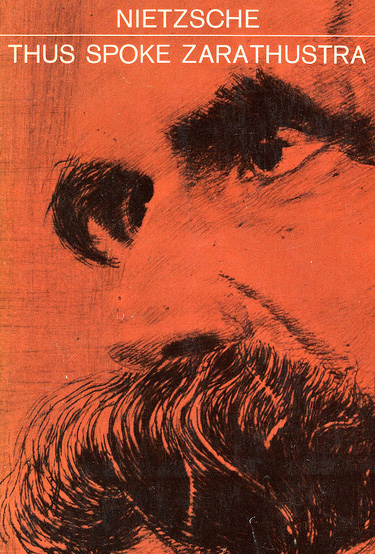4
Now Zarathustra looked at the people and he was amazed. Then he spoke thus:
“Mankind is a rope fastened between animal and Overman – a rope over an abyss.
A dangerous crossing, a dangerous on-the-way, a dangerous looking back, a dangerous shuddering and standing still.
What is great about human beings is that they are a bridge and not a purpose: what is lovable about human beings is that they are a crossing over and a going under.[1]
I love those who do not know how to live unless by going under, for they are the ones who cross over.
I love the great despisers, because they are the great venerators and arrows of longing for the other shore.
I love those who do not first seek behind the stars for a reason to go under and be a sacrifice, who instead sacrifice themselves for the earth, so that the earth may one day become the Overman’s.
I love the one who lives in order to know, and who wants to know so that one day the Overman may live. And so he wants his going under.
I love the one who works and invents in order to build a house for the Overman and to prepare earth, animals and plants for him: for thus he wants his going under.
I love the one who loves his virtue: for virtue is the will to going under and an arrow of longing.
I love the one who does not hold back a single drop of spirit for himself, but wants instead to be entirely the spirit of his virtue: thus he strides as spirit over the bridge.
I love the one who makes of his virtue his desire and his doom: thus for the sake of his virtue he wants to live on and to live no more.
I love the one who does not want to have too many virtues. One virtue is more virtue than two, because it is more of a hook on which his doom may hang.
I love the one whose soul squanders itself, who wants no thanks and gives none back: for he always gives and does not want to preserve himself.[2]
I love the one who is ashamed when the dice fall to his fortune and who then asks: am I a cheater? – For he wants to perish.
I love the one who casts golden words before his deeds and always does even more than he promises: for he wants his going under.
I love the one who justifies people of the future and redeems those of the past: for he wants to perish of those in the present.
I love the one who chastises his god, because he loves his god: for he must perish of the wrath of his god.[3]
I love the one whose soul is deep even when wounded, and who can perish of a small experience: thus he goes gladly over the bridge.
I love the one whose soul is overfull, so that he forgets himself, and all things are in him: thus all things become his going under.
I love the one who is free of spirit and heart: thus his head is only the entrails of his heart, but his heart drives him to his going under.
I love all those who are like heavy drops falling individually from the dark cloud that hangs over humanity: they herald the coming of the lightning, and as heralds they perish.
Behold, I am a herald of the lightning and a heavy drop from the cloud: but this lightning is called Overman. –”
______________________
The above German-English translation by Adrian del Caro is taken from Thus Spoke Zarathustra (Cambridge University Press, 2006). This Cambridge edition lacks the more detailed notes by Andrés Sánchez-Pascual in Así Habló Zaratustra (Madrid: Alianza Editorial, 2014), translated below.
Notes:
[1] See footnote 5. [Note of the Ed.: In this site’s translation: here]
[2] Paraphrase of Luke, 17, 33: “Whosoever shall seek to save his life shall lose it; and whosoever shall lose his life shall preserve it.”
[3] A direct quote inverting its sense of Hebrews 12: 6: “For whom the Lord loveth he chasteneth.” See also, in Part Four, “The Awakening.”

One reply on “Zarathustra’s prologue, 4”
Again, this brings in mind my metaphor of the bridge. This is what I wrote in the final essay of The Fair Race’s Darkest Hour: “White nationalism is only a stone at the middle of the rapid-flowing waters of a dangerous river; an over-the-water large stone that can help us in our endeavor to jump to the other side. I myself used that stone in my crossing from Christianity and Liberalism to National Socialism. In fact, I could even write down such a spiritual odyssey in a text that might be titled ‘From St Francis to Himmler’.” But no American white nationalist today is prepared to wear a T-shirt of Herr Himmler, not even in the privacy of their homes.
This cannot contrast more with today’s white nationalists, so reluctant to sacrifice themselves as Rockwell did. They want it both ways: enjoy their homely comfort zones and try to “save” the race from the ongoing extermination.